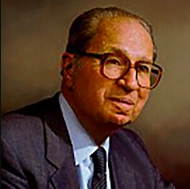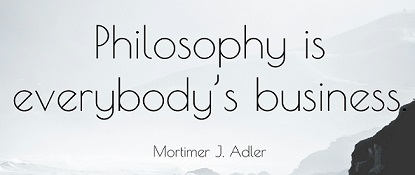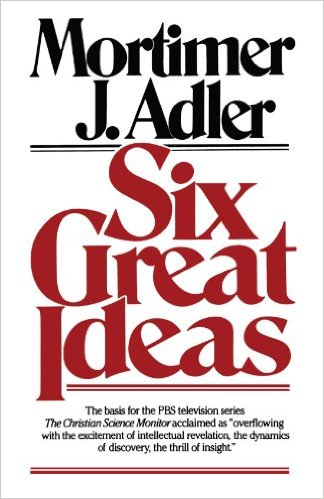|
Word Gems
exploring self-realization, sacred personhood, and full humanity
Dr. Mortimer J. Adler's
Six Great Ideas
truth, goodness, beauty: ideas we judge by
freedom, equality, justice: ideas we act on |
return to "Truth" main-page
 |
 |

|
Editor's prefatory comment:
When my children were little, it seems that I mentioned to them the title “Six Great Ideas”; what they heard was “sixth-grade ideas.” This has been a family joke since then.
But I still recall my astonishment, more than 40 years ago, at Adler’s lucid explanation of the meaning of truth, goodness, and beauty. First, in the PBS television series, and then with the book, I witnessed my cognitive structure undergoing severe dislocation. The Christian Science Monitor’s assessment, “overflowing with the excitement of intellectual revelation, the dynamics of discovery, the thrill of insight,” is no hyperbole.
Recently, I rediscovered "Six Great Ideas" and was somewhat taken aback, all over again, by its wealth of penetrating observations; and I said to myself, I need to promote these concepts to the WG readers. We cannot credibly discuss the pursuit of truth – the queen of the Great Ideas – without first securing its crisp definition. The concept of truth, like almost every other good thing in our totalitarian-leaning world, has been politicized and massaged into irrelevance: “my truth and your truth” is a common fraudulent statement.
We’ll get to the bottom of this fashionable prevarication.
|
please click on each link-icon
Preliminary discussion: The great ideas are everybody's business and constitute the essential vocabulary of thought
Preliminary discussion: Plato's view. Do the great ideas exist eternally, apart from us, even when no one is thinking about them?
Preliminary discussion: The six ideas under review form a subset of 102 topics which have occupied the attention of thinkers for the last 2500 years.
Preliminary discussion: The chosen few: why these six and not others?
The radical skeptic not only minimizes the concept of truth but might also claim that no statement is either true or false, that there are no absolutes of any kind. However, in this absolute statement the skeptic contradicts himself and undermines his own position.
There is a form of skepticism, of doubt, a hesitancy to rush to judgment, to pronounce ‘truth,’ that all thoughtful, educated persons will, at all times, underwrite. There are two extremes: excessive skepticism and excessive dogmatism.
The New Age movement has become one of the new religions of the world. Like all “infallible” dogmatisms, replete with sloppy thinking, it has its unquestioned doctrines, such as the fashionable and cachet prevarication, “I have my truth, and you have your truth.” But allow me to pop this air-head bubble.
The Realm of Doubt: Can we ever say, with complete assurance, “I know”? Is it possible to credibly state, “This is true beyond a shadow of a doubt”?
We use the word “knowledge” in two different ways, a strong and a weak sense: It can refer to absolute truth but also to one’s best judgment at the time.
There are matters of truth and matters of taste. We speak of French cooking or fashion but never French mathematics or physics.
Discussions of truth as objective or subjective, as fixed and immutable versus matters of personal taste, lead us to the realms of goodness and beauty.
Do we regard something as good simply because we desire it, or ought we to desire something because it is in fact good? Do some value judgments belong to the sphere of truth, instead of all being relegated to the sphere of taste? In other words, is there an objective standard for some goods, some objects of desire, things we ought to seek for?
Socrates spoke of “real” versus “apparent goods.” Real goods are what we ought to desire whether we do in fact desire them or not.
“Right desire” is a phrase employed by Aristotle suggesting that there are desires inherent in human nature, rooted in potentialities or capacities, that drive or tend toward fulfillment. These are the desires that we ought to have.
The range and scale of goods, objects of desire which offer benefit, express three degrees of evaluation or ranking.
The good, real or apparent, can be divided into the good we desire to have, the good we desire to do, and the good we desire to be.
The Ultimate Good: For something to be ultimate it must be that beyond which one cannot go. What can possibly occupy that unique place in the realm of goods?
Summum Bonum: In antiquity, the famous teachers employed the word "happiness" for ultimate good.
From Truth and Goodness to Beauty
|
beauty is not in the thing
Jiddu Krishnamurti, September 24, 1967, London: “Like love, beauty is not the cultivation of thought. A thing of beauty is not beauty. Beauty is not in the thing, in the building, in the person; but there is that beauty which is not the result of conditioning, in which thought in no way interferes.”
The sense of beauty is an opinion, a judgment, concerning the good and the true.
Beauty issues not from one's “hardware” but “software,” the “programming.”

See more discussion in the “waves” article.
|
Enjoyable Beauty: that which pleases or satisfies in the knowing or contemplating rather than in the having or possessing.
Admirable Beauty: that which is noteworthy due to intrinsic excellence or perfection, an appreciation of the well constituted with its unity, proportion, and clarity, even if one does not find it enjoyable in the ordinary sense of the term.
Existential Beauty: the Goodness of Beauty and the Beauty of Truth
Kairissi and Elenchus discuss how lovers' perceptions of existential beauty lead them to ultimate intimacy and oneness
Part I, Existential Beauty: Noting a sunrise as messenger of a new day is not the same as discerning the dawn as dreamily enchanting. The sublime awareness allowing for such is untainted by utilitarian concern.
Part II, Existential Beauty: Consonance with the whole: “What is good is in consonance with creation as a whole and therefore also with the world of men. Whenever we see the Good and the True in perfect accord, the Beautiful stands revealed.”
Justice, Freedom, and Equality are aspects of Goodness, but not uniformly so.
The sovereignty of Justice among the second triad: only Justice is an unlimited good.
The Freedom to do as one pleases, Part I: The three kinds of liberty.
The Freedom to do as one pleases, Part II: Liberty versus License; of the three, this is the only form of freedom needing to be regulated.
The Freedom to do as one pleases, Part III: The morally virtuous individual is one who, having the moral freedom of being able to will and choose as he ought, does voluntarily and freely what the law commands and refrains voluntarily and freely from doing what the law prohibits.
The Liberties To Which We Are Entitled
What is the basis of natural, human rights?
What is the basis of political rights?
The Dimensions of Equality
THIS PAGE IS UNDER CONSTRUCTION

|



